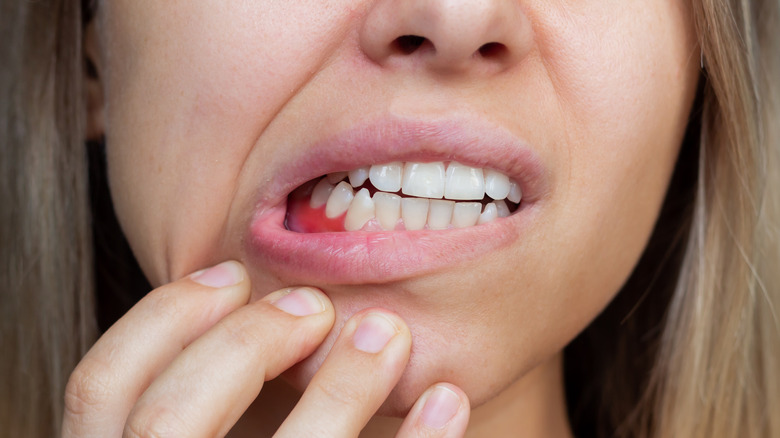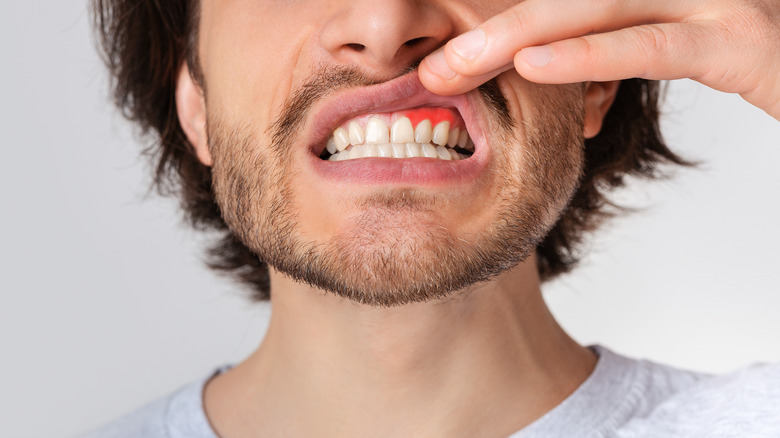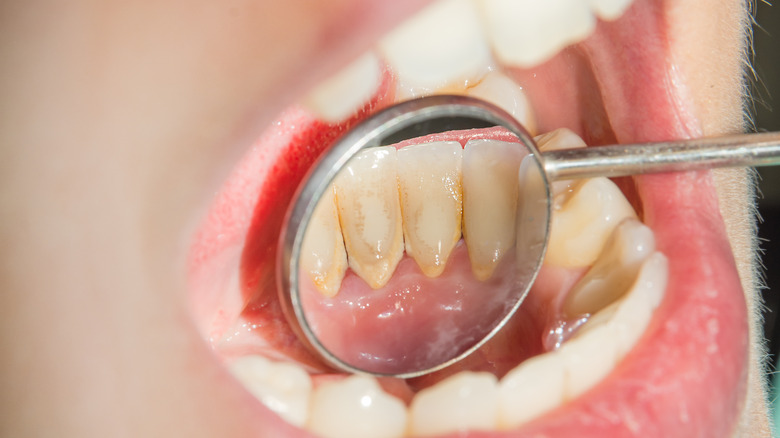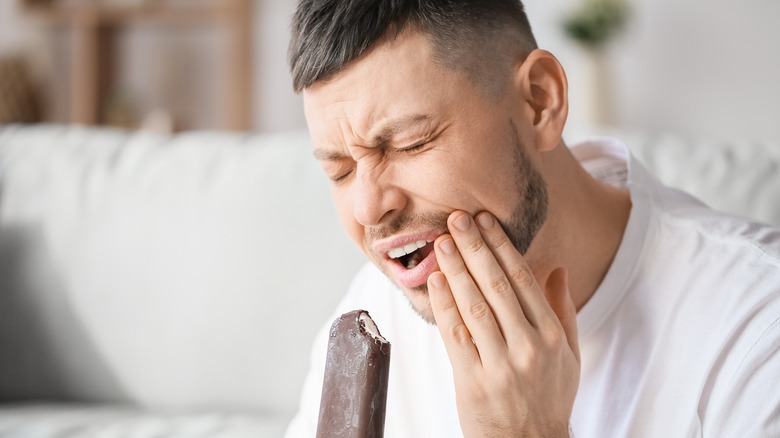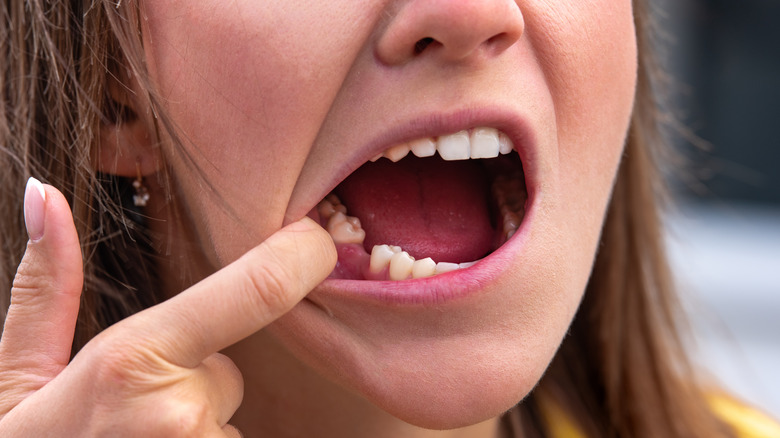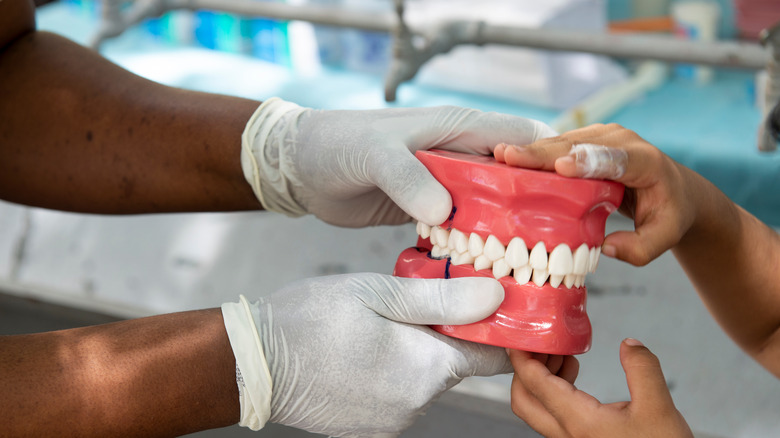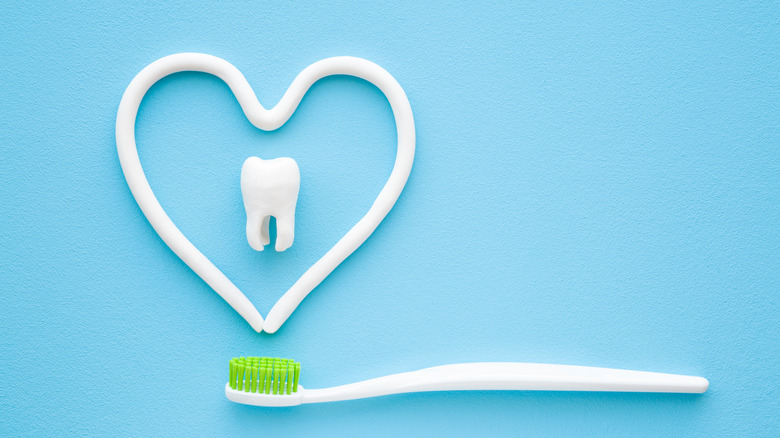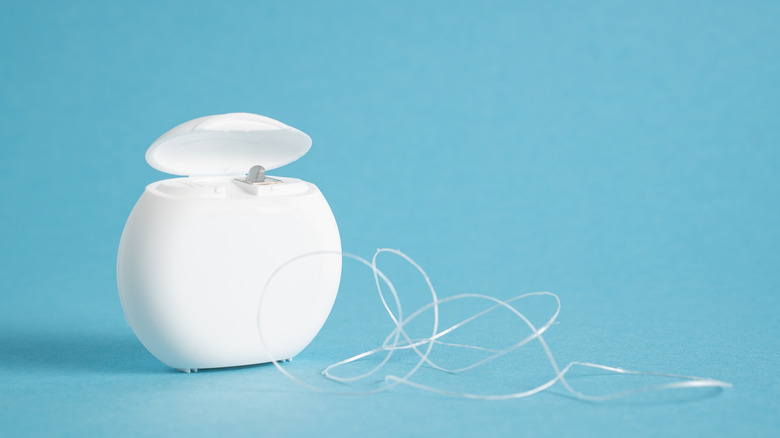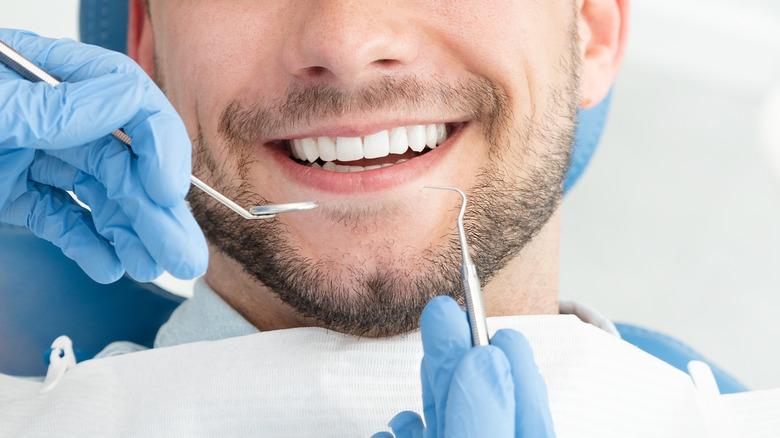When You Don't Floss, Here's What Happens To Your Teeth
Your dentist has likely told you (or scolded you) about how flossing is a necessity for your oral health. While brushing your teeth is probably second-nature, flossing gets sidelined because of being tired, lazy, or just not liking the action (or chore) of flossing. One survey found that 36% of Americans would rather do an unpleasant task like clean the toilet than floss (via WebMD).
Why is flossing such a hot-button issue for some? Your toothbrush only removes 60% of plaque and bacteria. The remaining 40% is picked up by flossing (via Redbook). Flossing allows you to access the hard-to-reach places that your toothbrush cannot reach effectively — and this is where bacteria can form (via American Dental Association).
Not flossing can have some negative implications on your teeth and overall health. After reading about some of these facts, you may be running to pick up a box or two of floss.
You can get bad breath
While this isn't necessarily something that affects your teeth, no one wants to be the person with the bad breath. Flossing can help battle bad breath — or halitosis. In fact, flossing is considered one of the easiest ways to keep your breath fresh (via Oral B).
Bad breath occurs when bacteria starts breaking down the food particles into acids, releasing a gas that causes an odor (via Macon Smiles). That bacteria can then affect the rest of your mouth, growing around the gums and tongue (via WebMD). Bad breath can be more than an irritating side effect. It can also be a sign of disease or infection.
So how can a little piece of floss make a big difference in your breath? Not only do you remove that food between your teeth, you disturb bacteria growth and stimulate your gums' blood flow, according to Macon Smiles.
Your teeth can start to decay, meaning more cavities
You may be thinking there is no way you could have cavities because you brush your teeth every day. Unfortunately, that is not the case. According to the Centers for Disease Control and Prevention (CDC) more than half of children have had a cavity in their baby teeth by the time they are 8 years old. And the risk doesn't stop in adulthood. One in four adults ages 20 to 64 currently has cavities.
That pesky bacteria attacks your tooth enamel and leads to cavities if you don't remove it by flossing. The good news is that flossing can even be retroactive for cavities in some cases. "In fact, patients who have early-stage cavities often reverse that decay by flossing daily as well as brushing and maintaining good oral hygiene," dentistry professor Sivan Finkel, New York University College of Dentistry, tells WebMD.
The experts agree — flossing can help you try to avoid experiencing the not-so-fun drilling and filling of a cavity.
Your gums can bleed and become sensitive
Have you ever been told by a dentist that your gums are bleeding? The discomfort may even be a reason why you've avoided flossing. While it may seem counterintuitive, experts say it is actually a good thing when your gums bleed or swell after flossing.
"This is how our body's inflammation response works ... your body is trying to irrigate the food, plaque, and bacteria in your gums with this inflammation and bleeding. When we mechanically stimulate our gums by flossing, it triggers this inflammation response," Lindsey Hesse, RDH, says in a Dental Associates blog.
The more you floss the healthier your gums are, and that means less bleeding or swelling. However, if you don't floss, your gum health could worsen into other more serious oral health conditions.
If you still experience bleeding or swelling after consistently flossing, it may be best to consult with your dentist or dental hygienist to check for other conditions.
You could develop gingivitis
If you've noticed blood or inflammation in your gums while flossing, you may have gingivitis — a mild form of gum disease. Gingivitis occurs when you have swelling or irritation at the part where your gums meet the bottom of your teeth (via the Mayo Clinic).
Gingivitis is caused by that nasty bacteria that creates plaque (more on that later). The crazy part is that gingivitis can develop in your mouth in just a few days (via Dental Associates).
If you don't treat gingivitis early on, it can develop into a more serious gum disease. Three out of four Americans will experience gingivitis in their lifetime (via Crest). But if you start to floss, you may be able to get your oral health back into tip-top shape. That all depends, however, on your specific condition and your dentist's recommendation.
It's also important to note there can be other causes of gingivitis than your oral health regimen, including smoking, stress, hormonal changes like pregnancy, medications, and chronic diseases, according to Crest.
You could have more plaque and tartar buildup
Odds are you've heard of plaque and tartar before reading this article. Plaque is the culprit for causing gum diseases like gingivitis, as well as bleeding and other oral health issues. If you don't start flossing, though, you may have one more thing to worry about. Once plaque is left in between your teeth for a while it hardens into tartar, which traps food particles even more and hampers your ability to clean your teeth (via Meyer Dental). This is because tartar can be above and under your gum line, so you likely wouldn't even see it yourself.
Once it gets to the tartar point, you can't floss it away — a dentist will need to scrape or break your tartar buildup off. Experts recommend stopping tartar in its tracks by flossing, but if you've already got it, be sure to visit your dentist regularly to get it removed. Tartar that sticks around too long can cause more serious issues like periodontitis.
Your teeth can become more sensitive
You may have heard the myth that flossing causes teeth sensitivity. While aggressive flossing can cause some pain for those with particularly sensitive teeth, it isn't the main cause (via Sensodyne). So don't pack your floss away! Your teeth become sensitive when your tooth enamel wears off and exposes the nerves.
Are your teeth particularly sensitive to cold or hot foods or drinks? It could be genetics, or you might be brushing your teeth too hard with a rough toothbrush (via Westport Dental). Try a softer-bristled toothbrush and tone down your brushing ferocity.
No excuses, though — you can still floss if you suffer from tooth sensitivity. Just be gentle, using a flossing technique with a curved "C" shape against the sides of your teeth — and you can always ask your dentist about proper technique. You also may be simply getting used to flossing, so experts say to give it time before quitting your new flossing routine.
You may lose teeth due to gum disease
As your oral health worsens because of not flossing, you may experience gum disease or periodontitis. A tell-tale sign of this is receding gums, or when your gums start pulling away from your teeth (via Southwest Smiles). Not only will this cause pain, it becomes a hiding spot for bacteria, eventually developing into periodontitis.
Periodontitis is where it starts to get serious. Some complications include tooth loss — either by your teeth falling out, becoming loose, or needing to be removed by your dentist due to cavities (via Meyer Dental). Tooth implants are a possibility, but if it becomes widespread you may end up with dentures.
Other signs of periodontitis are swollen, red, tender gums, bad breath, pus between your teeth or new spaces between your teeth (via the Mayo Clinic). You may also have pain while chewing, or even notice a difference in your bite.
There are treatment options for periodontitis that include a thorough cleaning, nonsurgical options like scaling or antibiotics, notes the Mayo Clinic. If your case is bad enough, your dentist may determine surgery is the best treatment plan.
Jaw bone deterioration
Another side effect of periodontitis is bone deterioration of your jaw. Over time, bacteria eats away at the jawbone that connects your tooth to your jaw. This is considered advanced periodontitis (via Colgate).
While you may not notice the bone deterioration right away, eventually you may experience issues with your remaining teeth. Tooth loss and gum disease are the common causes of bone deterioration, although there are other conditions or trauma that could lead to similar results (via Charleston Center for Cosmetic Dentistry).
In addition to jaw pain, you may experience headaches, have difficulty talking or eating, and start to see an effect on your nutrition. Bone loss in the jaw could prevent you from being able to get other dental work like dental implants.
If this wasn't scary enough, you may also see the effects on your outward appearance. Bacteria can attack the lower third of your face, which is why some experts say preserving that jawbone can lead to you looking younger as you age (via Colgate). This process leads to your facial muscles weakening, resulting in premature wrinkling and lip thinning.
There are treatment options available like bone grafting that will, over time, replace your bone loss.
You are more susceptible to infection
Oral health is often thought of being a "window to your overall health," (via the Mayo Clinic). So it's no surprise there is a link between bad oral hygiene habits and other ailments.
What may start off as a cut in your mouth could be exacerbated by the bacteria or tooth decay running rampant and turn into quite a dangerous mouth infection (via Meyer Dental). And that infection won't just stay in your mouth. It could spread throughout your body — and in serious cases turn into "fatal brain infections."
On a positive note, flossing can boost your immune system and help your body fight off bacteria or viruses, according to Brett Blacher,DDS. When bacteria attacks your mouth, inflammation kicks in via your immune system.
"Basically, this means that helpful immune system cells from your body will be sent to your gums, which will swell up and become more susceptible to bleeding. When this happens, there will be fewer helpful immune cells to fight back against infections elsewhere in the body," Blacher says in a post on his website.
Flossing can decrease your risk of infection or inflammation in your mouth. This means your body's immune system can run smoothly and, as a result, make it less likely for you to catch a cold or a flu.
Diabetics may have more health risks
As you've gathered by now, your oral health can have negative repercussions on other aspects of your well-being. It can be especially important for people with pre-existing conditions like diabetes. In fact, people with diabetes have a higher chance of developing gingivitis and periodontitis (via American Diabetes Association).
You may be wondering why diabetes affects your oral health. Those who are diabetic will have more of an inflammatory response to oral bacteria that could affect the support your gums can provide your teeth. Eventually, you may experience tooth loss. Dry mouth is also a complication for diabetics. In these cases, sugar, bacteria, or food debris won't get washed away with saliva as often.
Speaking of saliva, high blood sugar levels also cause your saliva to be higher in sugar. This can be a breeding ground for plaque, especially if you aren't already flossing to remove the existing food particles or bacteria (via Espire Dental).
You may experience other health complications
Other health complications can also result from poor oral health thanks to not flossing. The National Institutes of Health found in a study that periodontitis increases your risk for heart disease by 20%. Although multiple studies have found this connection, there are other factors that contribute to periodontitis and cardiovascular disease like smoking, alcohol, poor nutrition and limited access to health care (via Espire Dental).
Some experts doubt the correlation, saying that heart disease and gum disease just happen to share similar risk factors (via NPR). However, they do agree on the importance of oral health in general.
Health complications from mismanaged oral hygiene aren't limited to the heart — your lungs can also be impacted. Inhaling the oral infection into your lungs could cause pneumonia or respiratory infections (via Southwest Smiles). Other potential issues that can arise from not flossing are dementia, brain abscess, kidney disease, ulcers, and pregnancy complications.
You may not teach your children to floss
If you're not a flosser it may not just impact you. Experts say that studies point to those who floss being more likely to teach their children the importance of flossing. This means that parents who skip flossing are less likely to enforce flossing on their children (via Smile Surfers).
Like many things, childhood habits turn into adulthood habits much of the time — so start them young!
You may be wondering when it's time to teach your child to floss. It can be as soon as when your child's teeth get close together, typically between 2 and 6 years old (via Dentistry for Children). This may sound young, but the earlier you start a healthy tooth and gum foundation the better.
Though you might be the one flossing your child's teeth at first, eventually it will become a part of their routine. Most kids can floss on their own by 10 years old.
Flossing guidelines
If you have been convinced of the importance of flossing, you might be panicking at the thought of overhauling your oral hygiene routine. Luckily, there are tons of resources to help you get started.
The first step is to choose your floss. Studies have found that most Americans have used "unusual items" like fingernails, folded paper or cards, forks, knives, or spoons, and even safety pins to get in between their teeth (via the American Dental Association). However, it is recommended to stick with string floss, dental picks, tiny brushes or water flossers.
As for when to floss, the American Dental Association says it's not as imperative to choose an exact time. The important part is the actual flossing, so choose a time at least once a day that works best for you. The order of brushing your teeth or flossing first is also up to your preference.
"I tell my patients to incorporate flossing into other daily activities such as flossing in the shower, leaving it by the TV, leaving it by your deck or favorite chair," Lindsey Hesse tells Dental Associates. "Really, the possibilities are endless. Again, the success with flossing is doing it day after day, rather than the time of day that you do it."
If you want to perfect your flossing technique, you can view this step-by-step guide from the American Dental Association
Your smile won't be as bright
Flossing regularly also keeps your smile bright and white (via Dental Associates). But flossing is only part of the battle. You should also be visiting your dentist routinely for cleanings and care.
"Another important factor in overall oral health is dental cleanings every three to six months, depending on the health of your gums," Sienna Palmer, DDS at Meridien Dental tells Sensodyne. "The healthier you keep your gums with these hygiene tips, the less bleeding and sensitivity you will experience."
You should also seek advice from your dentist if you suspect you're suffering from gingivitis, tooth decay, periodontitis, or have questions about your susceptibility to other oral health diseases. Your dentist can also help find a flossing solution that works for you.
In the meantime, dentists recommend brushing your teeth at least twice a day and flossing once a day for a healthy, confident smile.




